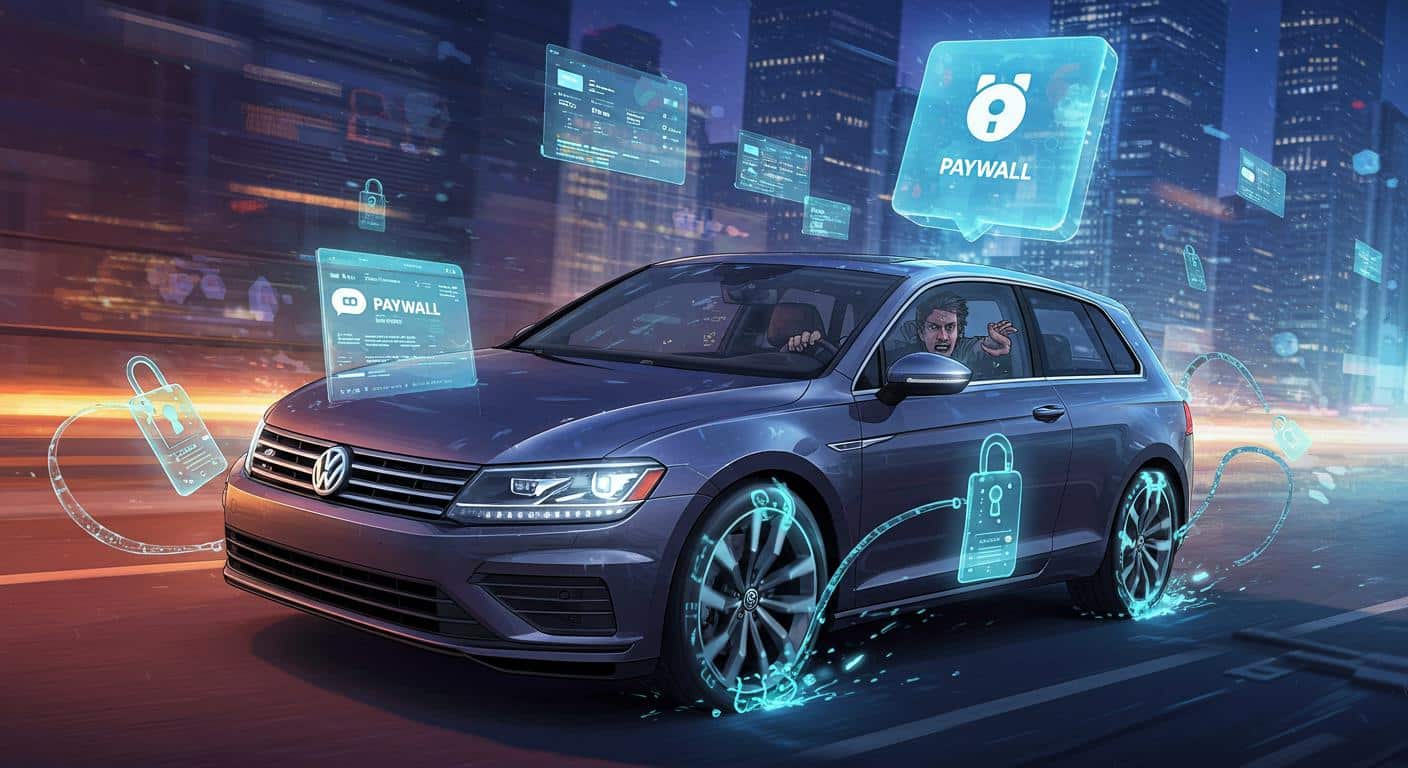There are days when the surreal edges into the mundane, and you almost miss the moment you crossed over into the future. One day you’re audibly scoffing at the idea of paying extra for ad-free TV; the next, you’re reading that Volkswagen has begun locking the full horsepower of your car behind a monthly fee. This isn’t satire. As Auto Express reports, Volkswagen’s latest move with the all-electric ID.3 is the automotive equivalent of charging you to unlock the contents of your own fridge.
The Monthly Horsepower Payment Plan
Here’s how Volkswagen is rolling this out: owners of the ID.3 Pro and Pro S will see their cars listed as producing 201 brake horsepower, but, according to Auto Express, can pay £16.50 per month after a free introductory trial to unlock the car’s full capability of 228 bhp. That’s not a typo—the extra 27bhp isn’t hardware you have to add; it’s already sitting under your right foot.
Auto Express details the costs: £16.50 each month or £165 a year for the privilege, or, for those who like a sense of closure, a “lifetime” upgrade at £649. Notably, this upgrade stays with the car rather than the owner, which means if you sell your ID.3, the new driver continues getting the extra burst of acceleration (assuming they don’t decide to go the monthly route themselves). These details put the cost at nearly three times an ad-supported Netflix subscription—one of those odd little benchmarks of modern life.
Auto Express also highlights that, according to Volkswagen, enabling the upgrade boosts torque from 265Nm to 310Nm but doesn’t impact battery range. And, because the car is registered with 228bhp output from the factory, there’s no need for owners to inform their insurance company—an intriguing loophole, if you’re comparing motoring red tape to, say, streaming service small print.
It does make you wonder: if you forget to renew your performance subscription, does your car quietly throttle back the next morning, as if on a digital diet plan?
The New Normal: Features As-a-Service
Volkswagen isn’t the first marque to turn “optional features” into something you unlock after delivery. Auto Express recalls BMW facing a similar storm of criticism for placing features like heated seats behind a paywall, while Polestar 2 drivers can also buy their way to more performance through software.
This isn’t so much a technological innovation as it is a business model shift. The performance, the comfort, even the cozy warmth of a seat—all of it’s potentially locked behind an account login and a recurring monthly charge. If it can be toggled on in software, someone seems eager to meter it out piecemeal.
That the performance upgrade is attached to the car (not the driver) is at least slightly pragmatic, as Auto Express points out. Still, the fact remains: the hardware is there from day one. Your relationship with it is more a matter of subscription status than mechanical aptitude.
Jailbreaks, Workarounds, and the Inevitable Backlash
In a detail highlighted by Auto Express, speculation has already surfaced about whether owners might “jailbreak” their cars to unlock the extra performance without paying—essentially flipping a switch that technically exists in their own vehicles. The outlet notes this could invalidate warranties or even lead to legal headaches with Volkswagen, though it remains to be seen just how vigorously the company would pursue such cases.
We’ve seen this dance play out in consumer tech before. Community forums devoted to workarounds, the occasional viral story about someone defeating digital locks, maybe even a cottage industry of unofficial “tuning” services. The question persists: when is your car truly yours, and when are you simply leasing access to capabilities you already physically own?
Reflections from the Subscription Front
Somewhere out there, one imagines a Volkswagen driver weighing the merits of recurring horsepower payments. Is the monthly fee for full performance genuinely worth it, or is the principle of the thing too galling to ignore? According to the specifics shared in Auto Express, the car arrives fully capable, yet its full potential is digitally rationed unless you keep those payments flowing.
Would automotive history buffs have believed it? Henry Ford, perhaps, picturing “all cars come with everything, but you have to subscribe for speed.” The strange genius in this system is that any feature—horsepower, heating, handling—isn’t a mechanical add-on, but a virtual one, unlocked or withheld by remote decree.
Could this be the final sunset for the classic, straightforward purchase? In a world where every possibility is always “just one payment away,” perhaps we’ll someday look back on heated seats controlled with a humble switch or horsepower measured in horses, not invoice lines, with a certain wistfulness. And maybe—just maybe—someday soon the dashboard warning isn’t for oil or tire pressure, but a friendly reminder that your acceleration is set to “basic” until you renew. Isn’t it odd what now counts as progress?







